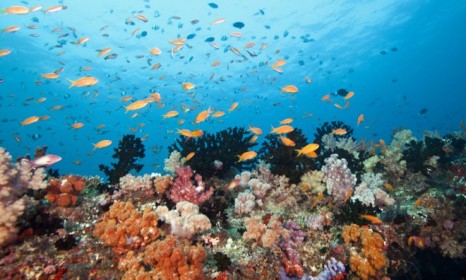Are the oceans dying?
A new report warns that many types of fish and whales could be wiped out if we don't do something — fast

A free daily email with the biggest news stories of the day – and the best features from TheWeek.com
You are now subscribed
Your newsletter sign-up was successful
Environmentalists have long been worried about the health of Earth's oceans, but a jarring new report from the International Programme on the State of the Ocean says things are worse than most scientists feared. In fact, the authors warn we're "at high risk of entering a phase of extinction of marine species unprecedented in human history." Here, a brief guide to the seas' decline:
Why do scientists think the oceans are in such trouble?
In recent years, some fish populations have declined by as much as 90 percent. In 1998 alone, record-high temperatures wiped out about 16 percent of the world's tropical coral reefs, which are crucial incubators of all kinds of sea life. Massive, low-oxygen "dead zones" are appearing where fish and other marine life can't survive. If the oceans continue on this path, the report says, mass extinctions — of fish, whales, and other marine species — are "inevitable."
The Week
Escape your echo chamber. Get the facts behind the news, plus analysis from multiple perspectives.

Sign up for The Week's Free Newsletters
From our morning news briefing to a weekly Good News Newsletter, get the best of The Week delivered directly to your inbox.
From our morning news briefing to a weekly Good News Newsletter, get the best of The Week delivered directly to your inbox.
What exactly is killing marine creatures?
The oceans are under siege by a "deadly trio" of threats — rising water temperature, acidification, and lack of oxygen — that played a role in similar mass extinctions 55 million years ago, says Jelle Bijma of the Alfred Wegener Institute. This time, humans are largely to blame, according to the report. Overfishing alone has pushed many species to the brink of extinction. Pollution and run-off of fertilizers from farms have choked out life in vast areas. And the oceans absorb most of the carbon dioxide we pump into the atmosphere, changing pH levels and adding stress on all kinds of marine creatures.
Can anything be done to reverse the decline?
One obvious fix, according to the IPSO, is a greater effort to prevent over-fishing, which "is now estimated to account for over 60 percent of the known local and global extinction of marine fishes," says William Cheung of the University of East Anglia, as quoted by Reuters. And, "unlike climate change, it can be directly, immediately and effectively tackled by policy change." Reducing pollution, including plastics, agricultural fertilizers and human waste, would help, too. Ultimately, though, the authors say we must eliminate carbon dioxide emissions. "If we don't do that," says Professor Ove Hoegh-Guldberg, as quoted by BBC News, "we're going to see steady acidification of the seas, heat events that are wiping out things like kelp forests and coral reefs, and we'll see a very different ocean."
A free daily email with the biggest news stories of the day – and the best features from TheWeek.com
-
 Palestine Action and the trouble with defining terrorism
Palestine Action and the trouble with defining terrorismIn the Spotlight The issues with proscribing the group ‘became apparent as soon as the police began putting it into practice’
-
 Why is the Trump administration talking about ‘Western civilization’?
Why is the Trump administration talking about ‘Western civilization’?Talking Points Rubio says Europe, US bonded by religion and ancestry
-
 Quentin Deranque: a student’s death energizes the French far right
Quentin Deranque: a student’s death energizes the French far rightIN THE SPOTLIGHT Reactions to the violent killing of an ultraconservative activist offer a glimpse at the culture wars roiling France ahead of next year’s elections